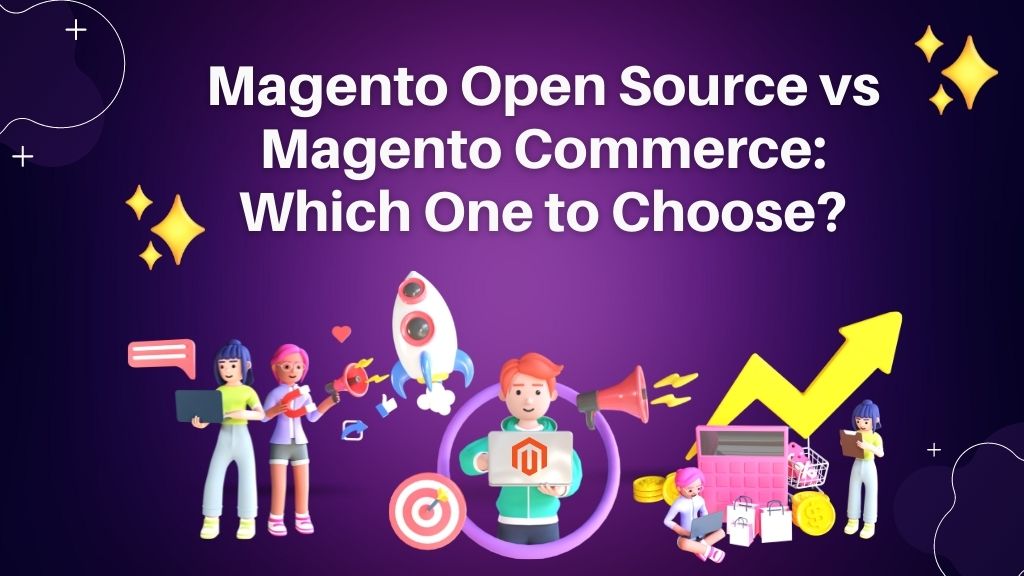While searching for the right e-commerce platform for your digital initiatives, you may have compared several market-leading platforms. Even after you’ve targeted one, the search doesn’t stop there. Due to the different versions offered by each platform to suit businesses of different sizes and budget constraints, you will need to broaden the comparison between the versions.
Magento Open Source and Magento Commerce are two similar versions of Magento. It can be very difficult to find the right one. We’ve written this guide to help you make that decision. But before we get to the head-on comparison, let’s start with an overview of the versions and platform nomenclature that have evolved over the years. Let’s dive.
Open Source Magento vs. Magento Commerce
Magento Open Source is an open-source e-commerce platform that offers a set of features that brands need to create and grow a unique online store from scratch. It’s getting a lot of attention from new businesses for one compelling reason: it’s free.
While it’s hard to beat this price, it may not be the best solution for businesses that will need an all-in-one cloud solution optimised for Magento, easy to deploy, with strong security and with additional built-in features. to accelerate sales. If you need all of this, you won’t have to look further than Magento Open Source.
Magento Commerce is a fully loaded e-commerce platform available in local or hosted versions. In our experience, Magento Commerce is essential for businesses that want to create unique and engaging shopping experiences. Also, specific Magento 2 extensions can help in improving the functionality of the store. It comes with rich out-of-the-box functionality, unparalleled customization capability, and seamless third-party integrations.
Magento Open Source Vs Commerce Comparison – Scalability
Growing with your business goals is what you expect from your e-commerce platform. In an e-commerce environment, growth means a lot of things. You can expand your product lines, enter foreign markets, add new sales channels, introduce a whole new brand, or even start selling directly to consumers.
Your platform must be able to follow your growth and your ambitions. While both platforms let you scale to handle more traffic and content, only Magento Commerce provides the additional tools you’ll need to support your business as it scales and runs faster with the help of SEO Magento extension.
Magento Commerce offers scalability benefits as you can use three separate backend databases for various functional requirements of the Magento web application.
Comparison of Magento Open Source Vs Commerce – Security
Both Magento Open Source and Commerce come with security features, but there are differences when you examine them in detail.
Security features like PCI compliance are an absolute requirement for all merchants. If you choose Magento Open Source, you will have to rely on a third-party payment gateway like PayPal or Braintree for PCI compliance. Your users will be redirected to said payment gateways to complete their transactions. Or, you can also choose PCI-compliant SaaS payment methods.
Magento Commerce is PCI compliant, which means that every card payment processed, stored or transmitted credit, debit or prepaid card information is done in a secure environment. Magento Commerce’s Magento Secure Payment Gateway and Payment Application Data Security Support (PA-DSS) ensure top-notch security for users and your store.
Other security features of Magento Commerce include user data encryption through AES-256 and SHA-256 hashing. Additionally, the 24/7 technical support offered by Magento Commerce will have a dedicated account manager who will monitor your store for fraud and possible attacks.
Magento Open Source vs Magento Commerce – B2B Features
One of the main differentiators between Magento Open Source and Magento is B2B support. Only Magento Commerce offers B2B features. Magento Commerce has built-in B2B functionality to facilitate all complex B2B workflows, transactions, quotes, order processes, etc.
Magento Open Source vs. Magento Commerce – Marketing
Marketing is the backbone of your brand’s ability to attract and convert visitors into customers. Your e-commerce platform should help you understand: who your best customers are, how they discover your site, their behavior on your websites, which segments are the most valuable. Additionally, your analytics tool should provide insight into the best ways to reach and engage them.
While Magento Open Source has basic marketing features, here are some important marketing benefits that only Magento Commerce offers.
Business Intelligence Panels: Advanced analytics tool to gain insights into users’ digital interactions with your store.
Customer Segmentation – Segment customers to customize pricing and marketing strategies.
Targeted Marketing and Promotions – Provides the ability to target customers with the most relevant marketing messages and bundle products for upsell and cross-sell opportunities.
Conclusion
Based on our comparison and business considerations, we can only conclude that Magento Commerce is the preferred choice for brands that need faster innovation and growth. At the same time, Magento Open Source can be the best option for brands that need all the basic e-commerce features to get into the market with good scalability and customization capabilities.
As with a decision between platforms, the decision to use Open Source and Commerce depends on the details of your business and your overall digital strategy. Every client has their own wish list and requirements when it comes to their brand, and the key to designing and implementing effective and efficient solutions to its brand. Therefore, it is advised to always hire a good Magento development company to get Magento development services.
To know more, visit https://webiators.com/
Explore More opportunities for your Magento 2 store at Webiators Store


